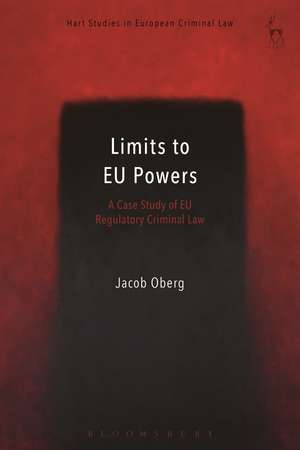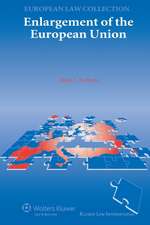Limits to EU Powers: A Case Study of EU Regulatory Criminal Law: Hart Studies in European Criminal Law
Autor Jacob Öbergen Limba Engleză Hardback – 26 iul 2017
| Toate formatele și edițiile | Preț | Express |
|---|---|---|
| Paperback (1) | 270.57 lei 6-8 săpt. | |
| Bloomsbury Publishing – 27 noi 2019 | 270.57 lei 6-8 săpt. | |
| Hardback (1) | 569.60 lei 6-8 săpt. | |
| Bloomsbury Publishing – 26 iul 2017 | 569.60 lei 6-8 săpt. |
Din seria Hart Studies in European Criminal Law
-
 Preț: 147.01 lei
Preț: 147.01 lei - 28%
 Preț: 374.46 lei
Preț: 374.46 lei - 22%
 Preț: 264.45 lei
Preț: 264.45 lei -
 Preț: 306.94 lei
Preț: 306.94 lei - 30%
 Preț: 607.18 lei
Preț: 607.18 lei - 30%
 Preț: 567.99 lei
Preț: 567.99 lei - 18%
 Preț: 322.33 lei
Preț: 322.33 lei - 34%
 Preț: 511.97 lei
Preț: 511.97 lei - 18%
 Preț: 322.80 lei
Preț: 322.80 lei - 22%
 Preț: 272.23 lei
Preț: 272.23 lei - 22%
 Preț: 270.57 lei
Preț: 270.57 lei - 18%
 Preț: 322.60 lei
Preț: 322.60 lei - 30%
 Preț: 571.66 lei
Preț: 571.66 lei - 27%
 Preț: 409.90 lei
Preț: 409.90 lei - 30%
 Preț: 835.93 lei
Preț: 835.93 lei - 22%
 Preț: 257.97 lei
Preț: 257.97 lei - 18%
 Preț: 306.94 lei
Preț: 306.94 lei - 18%
 Preț: 308.74 lei
Preț: 308.74 lei - 18%
 Preț: 306.47 lei
Preț: 306.47 lei - 18%
 Preț: 323.84 lei
Preț: 323.84 lei - 22%
 Preț: 273.06 lei
Preț: 273.06 lei - 18%
 Preț: 300.98 lei
Preț: 300.98 lei - 18%
 Preț: 299.55 lei
Preț: 299.55 lei - 18%
 Preț: 299.01 lei
Preț: 299.01 lei - 28%
 Preț: 466.81 lei
Preț: 466.81 lei
Preț: 569.60 lei
Preț vechi: 816.42 lei
-30% Nou
Puncte Express: 854
Preț estimativ în valută:
108.99€ • 114.10$ • 90.18£
108.99€ • 114.10$ • 90.18£
Carte tipărită la comandă
Livrare economică 05-19 aprilie
Preluare comenzi: 021 569.72.76
Specificații
ISBN-13: 9781509903351
ISBN-10: 1509903356
Pagini: 256
Dimensiuni: 156 x 234 x 22 mm
Greutate: 0.54 kg
Editura: Bloomsbury Publishing
Colecția Hart Publishing
Seria Hart Studies in European Criminal Law
Locul publicării:London, United Kingdom
ISBN-10: 1509903356
Pagini: 256
Dimensiuni: 156 x 234 x 22 mm
Greutate: 0.54 kg
Editura: Bloomsbury Publishing
Colecția Hart Publishing
Seria Hart Studies in European Criminal Law
Locul publicării:London, United Kingdom
Caracteristici
The author's Innovative case study approach in the field of EU criminal law offers a new basis for a review of competences.
Notă biografică
Jacob Öberg is Associate Professor in Law at Lund University.
Cuprins
1. Introduction I. The Question of EU Competence after Lisbon II. The Problems of the Existing Limits to EU Competences III. Main Arguments of the Book IV. Case Study-EU Regulatory Criminal Law V. Chapter Synopsis Part I: A Framework for Legality Review2. Principles Limiting the Exercise of EU Competences I. Introduction II. The System of Competence Monitoring III. Principle of Conferral IV. Principle of Proportionality V. Principle of Subsidiarity VI. Conclusions 3. Judicial Competence Review of EU Legislation I. Introduction II. The Link between Institutional and Conceptual Factors in Determining Intensity of Judicial Review III. The Case for Strict Procedural Review IV. The Court of Justice's Track Record on Procedural Review V. Setting the Framework for a General Standard of Review and Test for Legality of EU Legislation VI. Conclusions Part II: Limits to EU Powers4. Limits to the Union's Criminal Law Competence I. Introduction II. Limits to the Exercise of the Union's Criminal Law Competence Prior to the Lisbon TreatyIII. Limits to the Exercise of Express Union Criminal Law Competence after Lisbon Treaty (Article 83(2) TFEU) IV. Conclusions 5. The Legal Basis for EU Criminal Law Legislation-A Constitutional Choice? I. Introduction II. The Relationship Between Article 83(2) TFEU and Article 114 TFEU with Respect to Criminalisation Measures III. The Fight Against Fraud: The Relationship Between Article 325 TFEU and Article 83(2) TFEU IV. Conclusions 6. Subsidiarity as a Constraint to the Exercise of EU Competences I. Introduction II. The Substantive Meaning of Subsidiarity III. Judicial Review of Subsidiarity IV. Case Study: The Market Abuse Crimes Directive V. Conclusions 7. Political Control of EU Competences-National Parliaments in the Field of EU Criminal Law I. Introduction II. National Parliaments' Remit under the EWS Procedure III. National Parliaments' Pursuit of Competence Control in Practice-The Yellow Card Against the EPPO Proposal IV. Conclusions 8. Conclusion I. Competence Control of the Exercise of EU Competences II. Reconstructing the Limits of the Treaties III. Epilogue: Future Prospects
Recenzii
In these days of burgeoning specialist discussion and publication of what is now firmly embedded under the title 'EU criminal law', Jacob Oberg's book stands out as a distinctive contribution to the debates, with some real potential to drive forward policy and law.
[T]his book offers an informed and interesting contribution to the legal research in the field of European law, especially for the perspective of combining its constitutional analysis to the field of European criminal law, one of its recent areas of development and growth, but still a macro-area where tensions arise because the jus puniendi is at the core the State's powers over individuals.
Anyone who cares about the integration process and its legitimacy should consider the analysis offered within this book seriously. Hopefully, just as Öberg has considered the judicial scrutiny aspects related to the monitoring of EU powers, others in academia will concentrate on the lawmaking process part. Anyone interested in the foundations and limits of EU powers will find, in the analysis and proposals of this book, a great deal of food for thought.
[A]n excellent book which makes a significant contribution to the academic and policy debate on the development of EU criminal law within the Union's constitutional order. The book is particularly valuable in reframing the competence debate from analyses projecting upon the EU unrealistic expectations to copy national criminal justice systems to an analysis that examines, critically and thoroughly, the possibilities of EU action within the constitutional framework provided by EU law.
[T]his book offers an informed and interesting contribution to the legal research in the field of European law, especially for the perspective of combining its constitutional analysis to the field of European criminal law, one of its recent areas of development and growth, but still a macro-area where tensions arise because the jus puniendi is at the core the State's powers over individuals.
Anyone who cares about the integration process and its legitimacy should consider the analysis offered within this book seriously. Hopefully, just as Öberg has considered the judicial scrutiny aspects related to the monitoring of EU powers, others in academia will concentrate on the lawmaking process part. Anyone interested in the foundations and limits of EU powers will find, in the analysis and proposals of this book, a great deal of food for thought.
[A]n excellent book which makes a significant contribution to the academic and policy debate on the development of EU criminal law within the Union's constitutional order. The book is particularly valuable in reframing the competence debate from analyses projecting upon the EU unrealistic expectations to copy national criminal justice systems to an analysis that examines, critically and thoroughly, the possibilities of EU action within the constitutional framework provided by EU law.















